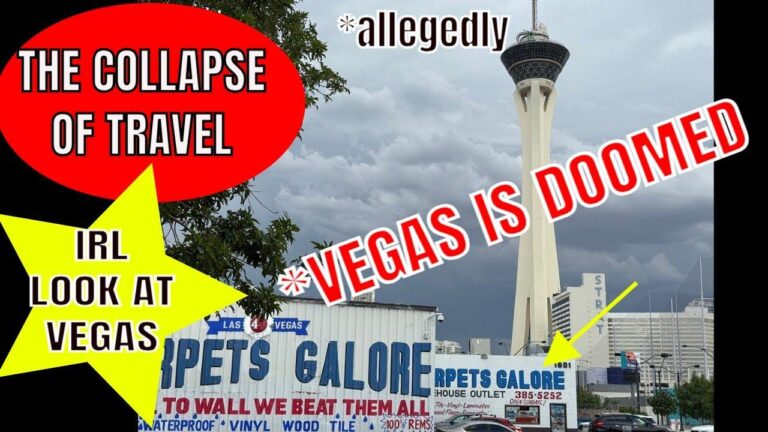Las Vegas Tourism Slump Signals Widespread Challenges for U.S. Casino Destinations
Widespread Decline in Casino Tourism Highlights Economic Struggles Across U.S. Gambling Cities
Once hailed as the pinnacle of American gaming and entertainment, Las Vegas is now confronting a meaningful drop in tourist arrivals, a trend that is echoing through other prominent casino cities nationwide. Experts link this downturn to a complex mix of factors, including persistent inflationary pressures, evolving consumer tastes, and the ongoing aftermath of the COVID-19 pandemic, which continues to alter travel behaviors. Additionally, the rapid expansion of legalized gambling in various states and the surge in online betting platforms have fragmented the market, compelling traditional casino hubs to fiercely compete for a shrinking pool of discretionary spending.
Key challenges impacting casino cities across the country include:
- Economic Instability: Stagnant wages combined with rising living expenses are curbing consumers’ ability to spend on leisure and entertainment.
- Market Saturation: The proliferation of regional and tribal casinos is drawing visitors away from established urban gambling centers.
- Digital Disruption: Online gambling platforms offer unmatched convenience, challenging brick-and-mortar casinos to innovate.
- Travel Reluctance: Economic uncertainties have made travelers more cautious, reducing long-distance tourism.
| City | Tourism Decline (%) | Impact on Casino Revenue |
|---|---|---|
| Las Vegas | 18% | Significant |
| Atlantic City | 12% | Moderate |
| Reno | 9% | Moderate |
| Biloxi | 7% | Minimal |
Economic Fallout and Employment Challenges in Key Gambling Markets
The sharp decline in tourism has had profound repercussions on local economies that once thrived on casino-generated income. Hospitality, entertainment, and retail sectors in these cities are witnessing significant job losses as visitor numbers dwindle.Numerous businesses dependent on a steady influx of gamblers and tourists are either downsizing or closing, which in turn strains municipal budgets and public services. The labor market, once robust, now faces unprecedented layoffs, reduced working hours, and hiring freezes.
- Casino Workforce Reductions: Rising unemployment claims among dealers, hotel employees, and security staff.
- Vendor Revenue Declines: Suppliers and contractors linked to casinos report shrinking sales.
- Tourism Industry Setbacks: Hotels, restaurants, and entertainment venues experience lower income streams.
| City | Estimated Job Losses | Tourism Revenue Decline (%) |
|---|---|---|
| Las Vegas | 15,000+ | 30% |
| Atlantic City | 4,000+ | 25% |
| Reno | 2,500+ | 18% |
In response, city officials and industry leaders are exploring ways to diversify their economic bases to reduce reliance on gaming revenues. Initiatives include fostering alternative industries and community programs aimed at stabilizing employment. Without decisive action or a resurgence in tourism, experts warn that the economic distress could deepen, affecting not only casino operations but also the broader communities that depend on them.
Changing Tourist Preferences and the Rise of New Casino Destinations
Recent studies reveal a notable shift in the desires of casino tourists, reshaping the competitive dynamics of the gambling industry. Traditional powerhouses like Las Vegas are no longer the exclusive destinations for gaming enthusiasts and entertainment seekers. Increasingly, visitors are drawn to locations that offer a blend of experiences beyond gambling, such as upscale dining, interactive shows, and wellness retreats. This evolution diminishes the appeal of vacations centered solely on casinos, compelling established cities to innovate their offerings to stay competitive.
Smaller markets, once overlooked, are seizing this opportunity by enhancing their amenities and leveraging lower operational costs. Cities like Atlantic City and Biloxi have upgraded their infrastructure and marketing efforts, successfully attracting visitors who might have previously chosen Las Vegas. The table below compares key features and visitor satisfaction rates that illustrate how these emerging competitors are gaining ground.
| Destination | Casino Selection | Non-Gaming Attractions | Visitor Satisfaction (%) |
|---|---|---|---|
| Las Vegas | Extensive | Moderate | 68% |
| Atlantic City | Moderate | High | 75% |
| Biloxi | Moderate | High | 72% |
| Reno | Limited | Moderate | 70% |
- Transition from high-stakes gambling to social and leisure-focused activities is driving demand for enhanced non-gaming amenities.
- Growth of regional markets offering affordable and diverse visitor experiences.
- Emphasis on local culture and lifestyle to create unique and authentic destinations.
Actionable Strategies to Revive Tourism in U.S. Casino Cities
Reversing the decline in casino city tourism requires a complete and innovative strategy. Expanding entertainment options beyond gambling is essential to attract a wider audience. Cities should invest in cultural events, luxury retail, and immersive technology-driven experiences to captivate visitors. Collaborations with social media influencers and international event promoters can help draw younger demographics seeking engaging and shareable experiences. Moreover, improving public safety and sanitation standards is critical to restoring traveler confidence in the post-pandemic environment.
Economic policies must also be adjusted to support local tourism ecosystems. Offering tax incentives to small hospitality enterprises and subsidizing lasting transportation options near casino districts can enhance accessibility and affordability. The table below summarizes key initiatives alongside their anticipated benefits:
| Initiative | Focus Area | Projected Outcome |
|---|---|---|
| Expanded Entertainment Offerings | Attractions & Events | Attracts diverse visitor segments |
| Enhanced Safety Measures | Public Health & Infrastructure | Boosts visitor trust and comfort |
| Tax Relief Programs | Economic Support | Stimulates growth of small businesses |
| Transportation Subsidies | Accessibility | Improves ease of travel to casino hubs |
Conclusion: Navigating the Future of U.S. Casino Tourism
As Las Vegas and other major gambling cities face a steep decline in tourism, the repercussions are being felt across the entire U.S. casino industry.This crisis demands urgent adaptation to evolving consumer preferences and economic realities. The path forward lies in strategic diversification, innovation, and community engagement to revitalize these iconic destinations and secure their place in a rapidly changing market landscape.




